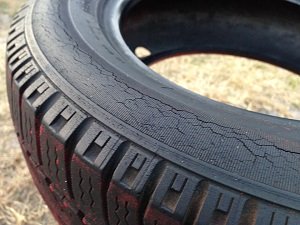How to Perform A Safety Inspection on Your Tires
December 27th, 2018
Tires are one of the most important parts of your vehicle. Poorly maintained tires can lead to dangerous or deadly accidents at worst and a negative impact on your vehicle’s handling at best. It’s important for every driver to regularly inspect their tires for proper inflation, tread depth, and sidewall condition. Performing this quick, regular check can help you stay safe on the road.

Step One: Check Your Tread Depth
This step is probably one you know. Worn out tread on your tires can prevent you from maintaining traction on the road and even keep you from being able to brake properly in an emergency. To check your tread depth, place a penny between the tread blocks of your tire. With Lincoln’s head upside-down, you shoul ...[more]
Tags:
tires
Posted in:
Tires 101
The Different Types of Engine Oil
December 13th, 2018
If you’ve ever taken a car in to be serviced, you’ve probably been asked by the mechanic, “What type of oil are you getting?” If you’re like most people, you probably just say “Whatever it takes,” or “Whatever you recommend!” Depending on your vehicle, the mechanic may recommend one of four types of motor oil: full synthetic, synthetic blend, conventional, or high mileage. Each type of oil has a specific chemical makeup and purpose it is best suited for:

Conventional Motor Oil: Conventional motor oil is the most commonly used type of motor oil. It is ideal for late-model, light-duty cars with low to average mileage and simple engine design.
Full Synthetic Motor Oil: Full synthetic motor oil differs from conve ...[more]
Tags:
oil change
Posted in:
Auto Repair 101
Categories
Archives
2022
October (1) September (1) August (1) July (1) June (1) May (1) April (1) March (1) February (1) January (1)
2021
December (1) November (1) October (3) September (1) August (1) July (1) June (1) May (1) April (1) March (1) February (1) January (1)
2020
December (2) November (2) October (2) September (2) August (2) July (2) June (2) May (2) April (2) March (4) February (2) January (2)
2019
December (2) November (2) October (2) September (2) August (3) July (2) June (2) May (2) April (4) March (2) February (4) January (3)
2018
December (2) November (4) October (2) September (5) August (10) July (8) June (8) May (4) April (3) March (5) February (5) January (6)
2017
December (5) November (6) October (4) September (8) August (4) July (7) June (4) May (5) April (4) March (5) February (4) January (3)
2016
December (4) November (2) October (4) September (6) August (4) July (7) June (9) May (12) April (8) March (10) February (10) January (16)
2015
December (12) November (16) October (12) September (8) August (14) July (5) June (10) May (14) March (10) February (6)
2014
November (10) October (8) September (7) August (9) July (4) June (8) May (8) April (10) March (7) February (10) January (4)
2013
Tags
tires MPG gas mileage New Warehouses preventative maintenance winter auto repair winter car service tire summer tires all season tires winter tires drivers safety auto repair auto service brakes brake service flat tires car repair oil change brake fluid transmission fluid power steering fluid tire pressure Fuel Economy air conditioning car alignment Mother's Day AC Service wheel alignment tire rotation tire repair tread depth tread wear replacing tires driving safety back to school tire rotation service tire inflation Halloween vehicle lighting headlights holiday travel oil changes car air conditioning mechanic car battery snow tires high mileage car high mileage engine tire recycling tire technology tips auto facts tire facts check engine light spark plug truck tires used car buying tips performance upgrades Serpentine Belt Timing Belt Spare Tire Tire safety Parking Brake Engine Facts Auto Maintenance Tire Maintenance Traffic Laws Buy New Tires Tire Types headlight restoration Tire Recycle Auto Repair



